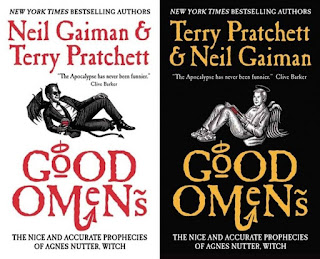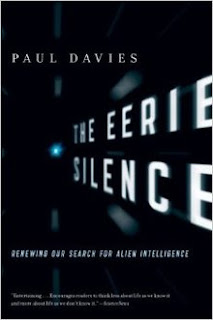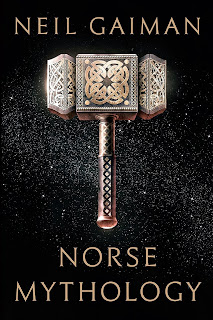Apocalyptic prophecies for the pandemic
Good Omens
N. Gaiman, T. Pratchett
There was a time, in high school, when a number of my friends were reading and praising Terry Pratchett books. I wouldn't touch one. Not because I have something particularly against Terry Pratchett, I don't. Partly, it was because I had developed a somewhat allergic reaction to fiction. We had to read a lot of fiction in literature and English literature classes, most of which I found hard to relate to, if not downright boring. It's never made sense to me, for example, why Steppenwolf is in the compulsory reading list, while Siddhartha and The Glass Bead Game are not. Not only are the latter two superior books, they are also far more interesting. Hence, I heavily gravitated towards non-fiction, going to sleep at night with a copy of Capitalism and Freedom on my bedside table where normal people would keep a bible or a paperback.
My reading table was also quite full of Economist and The World Press Review magazines as well as various printed and copied articles and evidence packs for debate cases. Mostly, though, my reluctance to dip into a Pratchett book was about choosing my own books, not reading what everyone else was reading. I figured a time would come, when I would look into what all the fuss was about. The same goes for Neil Gaiman - when American Gods was all the craze, I was careful to pass around it in a large circle. Kind of the same reason I 'm yet to pick up anything by Harari. I have bought them, they are in my now-digital bookshelf, but I'll give it another ten years or so and if they have stood the test of time, then maybe I'll take a look. Rushing headfirst into a book just because people around you seem to think the book is good has never been cup of tea.
Now, with the Covid-19 pandemic raging outside and everyone spending more time at home, I was looking for some dark humour well written. Not that there is any more time to read, quite the opposite. But there were some hours of the night where I could use a laugh. And if you bring two ingenious writers together for a single story about armageddon, then - entertainment guaranteed.
It was interesting trying to trace what had been written by which author. This being my first Terry Pratchett ever, I've nothing to go on to identify his writing. But by now I've read most Neil Gaiman novels, so by identifying his work and separating it, it was easy to deduce, which bits had more Pratchett in them. Of course, I have absolutely no confirmation for my deductions. Perhaps there are sources, where the authors have dissected the book themselves, but I did not go to look for them. It was just a small, enjoyable mental exercise for myself. In all honesty, though, I think if two good writers are writing a book together in a way that they describe having written it, it is bound to have so much of one bouncing off of and reflecting the other, that no clear lines are possible. Nevertheless, there is an image here, a scene there, a sentence in the third place, that either sounds like Gaiman or then doesn't. Which should mean it sounds like Pratchett. I liked these self-designated Gaiman bits more, the Pratchett bits I sometimes found too over-the-top or too obvious. With Gaiman, it's more innuendos and references you have to dig into to discover.
Overall, I found what I was looking for - appropriate dark humour about the end of days and how, in the end (of the end), human experience and reason save the day. In these days of pandemic panic, that is a welcome message. And let's be honest, who can resist reading about willfully stylish demons driving around in flaming 1926 Bentleys and the Four Horsemen of the Apocalypse arriving on flying choppers in the form of sexy war correspondents and food industry businessmen. Recommend.
My reading table was also quite full of Economist and The World Press Review magazines as well as various printed and copied articles and evidence packs for debate cases. Mostly, though, my reluctance to dip into a Pratchett book was about choosing my own books, not reading what everyone else was reading. I figured a time would come, when I would look into what all the fuss was about. The same goes for Neil Gaiman - when American Gods was all the craze, I was careful to pass around it in a large circle. Kind of the same reason I 'm yet to pick up anything by Harari. I have bought them, they are in my now-digital bookshelf, but I'll give it another ten years or so and if they have stood the test of time, then maybe I'll take a look. Rushing headfirst into a book just because people around you seem to think the book is good has never been cup of tea.
Now, with the Covid-19 pandemic raging outside and everyone spending more time at home, I was looking for some dark humour well written. Not that there is any more time to read, quite the opposite. But there were some hours of the night where I could use a laugh. And if you bring two ingenious writers together for a single story about armageddon, then - entertainment guaranteed.
It was interesting trying to trace what had been written by which author. This being my first Terry Pratchett ever, I've nothing to go on to identify his writing. But by now I've read most Neil Gaiman novels, so by identifying his work and separating it, it was easy to deduce, which bits had more Pratchett in them. Of course, I have absolutely no confirmation for my deductions. Perhaps there are sources, where the authors have dissected the book themselves, but I did not go to look for them. It was just a small, enjoyable mental exercise for myself. In all honesty, though, I think if two good writers are writing a book together in a way that they describe having written it, it is bound to have so much of one bouncing off of and reflecting the other, that no clear lines are possible. Nevertheless, there is an image here, a scene there, a sentence in the third place, that either sounds like Gaiman or then doesn't. Which should mean it sounds like Pratchett. I liked these self-designated Gaiman bits more, the Pratchett bits I sometimes found too over-the-top or too obvious. With Gaiman, it's more innuendos and references you have to dig into to discover.
Overall, I found what I was looking for - appropriate dark humour about the end of days and how, in the end (of the end), human experience and reason save the day. In these days of pandemic panic, that is a welcome message. And let's be honest, who can resist reading about willfully stylish demons driving around in flaming 1926 Bentleys and the Four Horsemen of the Apocalypse arriving on flying choppers in the form of sexy war correspondents and food industry businessmen. Recommend.




Comments
Post a Comment